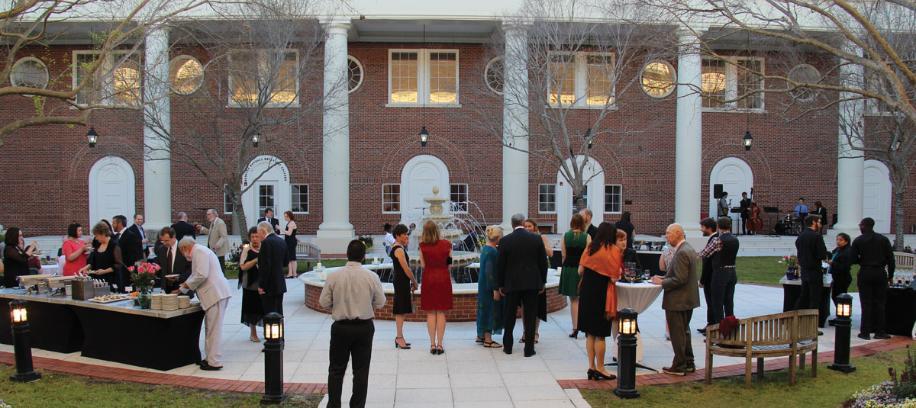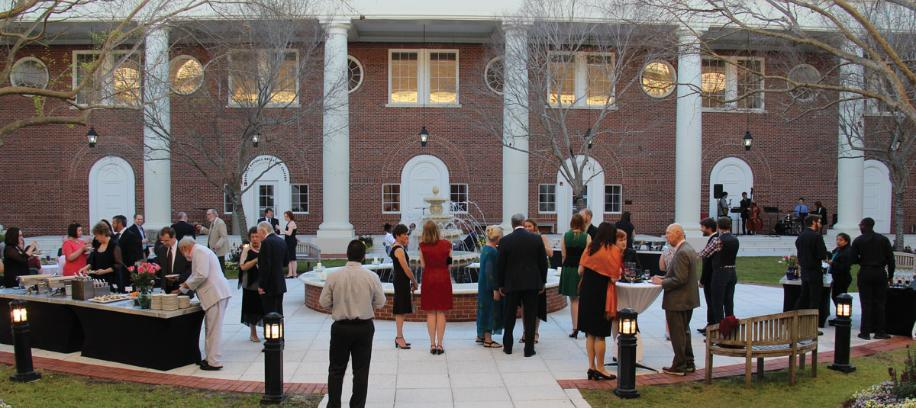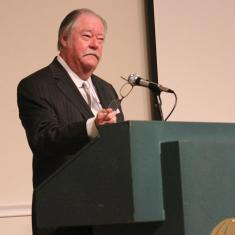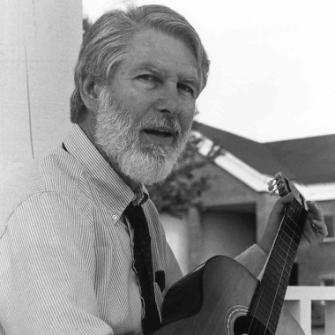Admiration and Inspiration

Reflecting on the Life and Legacy of Charles Joyner

Coastal Carolina University community members and faculty convened in the Edwards Courtyard on a perfect spring evening to celebrate the legacy of Charles Joyner (1935-2016), Distinguished Professor Emeritus of Southern History and Culture, and to learn about the unfolding continuation of his work through the Charles Joyner Institute for African and Diaspora Studies. “Shared Traditions: A Tribute to Charles Joyner” served to link the past to the future.
Though all attendees – including history colleagues, Joyner family members, CCU Provost Ralph Byington, former CCU Executive Vice President Eddie Dyer and retired CCU President Ron Ingle – knew Joyner on both professional and personal levels, nearly everyone present experienced renewed memories of the historian, scholar and friend who made a meaningful and lasting contribution to the University.
After mingling in the courtyard while a live faculty and student jazz quartet performed, attendees entered the Edwards Recital Hall for a program of speakers, live music and a documentary film that traced a progression through Joyner’s life, tenure at CCU, publications, and related interests in music and Gullah culture.
 “Chaz Joyner was a name in the field of history,” said Eldred E. “Wink” Prince Jr., director of the Waccamaw Center for Cultural and HistoricalStudies, during his presentation. “At academic conferences, people would read my name tag and go, ‘Coastal Carolina University? Why, that’s where Chaz is.’ Whether he was there at the conference or not, he introduced me to people and events I never would have encountered otherwise.”
“Chaz Joyner was a name in the field of history,” said Eldred E. “Wink” Prince Jr., director of the Waccamaw Center for Cultural and HistoricalStudies, during his presentation. “At academic conferences, people would read my name tag and go, ‘Coastal Carolina University? Why, that’s where Chaz is.’ Whether he was there at the conference or not, he introduced me to people and events I never would have encountered otherwise.”
Student and faculty musicians performed favorite songs of Joyner’s, including student vocalists Shirra Ward ’16; Whitney Daniels ’17, Justin Hall and Courtney Gruber; and junior Cynthea Kelley, singing “Heaven is a Beautiful Place.” CCU artist-in-residence Steve Bailey shared stories of taking music lessons with Joyner’s sister and times spent with Joyner discussing the merits of various jazz musicians.
“Dizzy Gillespie was one of his favorites,” Bailey recalled just before performing “A Tribute to Dizzy Gillespie” with a faculty group including Bailey on bass; Matt White, CCU assistant professor of music, on trumpet; and Tim Fischer, CCU assistant professor of music, on guitar.
A documentary film titled Tales and Traditions: the Legacy of Charles Joyner highlighted Joyner’s roots in Horry County and his career as a professor and scholar at CCU as well as his penchant for storytelling and his groundbreaking study of Gullah culture along the Waccamaw Neck, as documented in his book Down By the Riverside: A South Carolina Slave Community. The film includes interviews with colleagues and administrators who witnessed firsthand Joyner’s passion for history, Southern folk culture, music and making connections among people.
“Coastal Carolina University is respected within the Gullah community because of Charles Joyner,” says Eric Crawford, CCU assistant professor of music, in the film.
Daniel J. Ennis, dean of the Thomas W. and Robin W. Edwards College of Humanities and Fine Arts, discussed Joyner’s practices as historian and how they foregrounded his perspective on Gullah communities and culture. “He knew that to tell the story, he had to take a different path, and listen. In works such as Folk Song in South Carolina, Down By the Riverside, Shared Traditions and Remember Me, in his many essays, forewords, and articles, we see evidence that Joyner listened — and then, eventually, wrote,” Ennis said. “We honor Joyner by listening and by teaching others to listen, and by telling the story and teaching others how to tell it as well.”
how to tell it as well.”
The second half of the program shifted focus toward the future. Gillian Richards-Greaves, assistant director of the Joyner Institute and assistant professor of anthropology and geography, discussed how the work of the institute will build on the foundation Joyner provided, allowing students to study the African diaspora in local areas but also expanding to investigate its reverberations in other areas including the West Indies and Africa. Veronica Gerald, director of the Joyner Institute and assistant professor of English, provided details of internships and experiential learning opportunities for students that will be implemented in future semesters.
“With his passing, a library has closed,” she explained, referring to an oral tradition and employing an analogy used in her own Gullah community. “But he also left us plenty of material, and there’s plenty more work for us to do.”
As the group dispersed back into the Edwards Courtyard after the program, spirits were high with both nostalgia and anticipation as people discussed the details of the event and the calling of the institute.
Crawford encapsulated this outlook neatly through his remarks in the film.
“We have this name now,” Crawford said. “We have an obligation, a challenge, a responsibility.”
With direction, insight and hard work, the Joyner Institute will continue Joyner’s tradition of observing, listening and writing in telling the story of the African diaspora through its people, lifestyle and culture.
For more information and to view the documentary, visit coastal.edu/joynerinstitute.
Photos by Abby Sink